More words from MP's Flying Circus:
spur Verb /spər/
Synonyms:
verb: goad, incite, stimulate, urge, prodnoun: incentive, goad, stimulus, impulse, inducement
spurring present participle; spurred past participle; spurs 3rd person singular present; spurred past tense
1.Urge (a horse) forward by digging one's spurs into its sides
she spurred her horse toward the hedge
2.Give an incentive or encouragement to (someone)her sons' passion for computer games
spurred her on to set up a software store
3.Cause or promote the development of; stimulate
governments cut interest rates to spur demand
dago
Noun /ˈdāgō/dagoes plural; dagos plural
An Italian, Spanish, or Portuguese-speaking person
dago red
Cheap red wine, typically from Italy
(I suppose it has tittle to do with the
jews' deity, or Lovecraft's homonym tale)
spur
Noun /spər/spurs plural
1.A device with a small spike or a spiked wheel that is worn on a rider's heel and used for urging a horse forward
2.A thing that prompts or encourages someone; an incentiveprofit was both the spur and the reward of enterprise
3.A steel point fastened to the leg of a gamecock
4.A climbing iron
5.A thing that projects or branches off from a main body, in particular
6.A projection from a mountain or mountain range
7.A short branch road or rail line
8.A slender tubular projection from the base of a flower, e.g., a honeysuckle or orchid, typically containing nectar
9.A short fruit-bearing side shoot
'struth
Interjection
Alternative spelling of strewth.
strewth
Alternative forms
streuth, strooth, struth, ’struth
Etymology
From "His truth", i.e., (God’)s truth. Compare zounds, blimey
so then:
zounds
Etymology
Abbreviation of God's wounds, with reference to Christ's wounds before the crucifixion.
Compare strewth, blimey, gadzooks, 'sblood.
gadzooks
Etymology
Contraction of God’s hooks, with reference to the nails of the crucifixion of Jesus.
Pronunciation IPA: /ɡædˈzuːks/
Interjection (archaic) An expression of surprise, shock etc.
finally:
blimey
Alternative forms
blimy
Etymology
Contracted from blind me! or blame me. Compare 'sblood, strewth, zounds, etc.
Pronunciation IPA: /ˈblaɪmi/
Interjection (British, Australian) Expressing anger, surprise, excitement, etc.
sod
Noun /säd/
Synonyms:
noun: turf, sward, lawn
1.The surface of the ground, with the grass growing on it
2.A piece of this, usually sold in rolls and used to start a new lawn, athletic field, etc
Noun
sods plural
1.An unpleasant or obnoxious person
2.A person of a specified kind
3.Something that is difficult or causes problems
sod
Verb /säd/
sodded past participle; sods 3rd person singular present; sodding present participle; sodded past tense
Cover with sod or pieces of turf
the stadium has been sodded
1.Used to express one's anger or annoyance at someone or something
2.Go away
3.Used as a general term of contempt
bugger
Verb /ˈbəgər/ /ˈbo͝og-/
Synonyms:
verb: screw
noun: pederast
buggered past participle; buggers 3rd person singular present; buggering present participle; buggered past tense
Noun /ˈbəgər/ /ˈbo͝og-/buggers plural
A contemptible or pitied person, typically a man
A person with a particular negative quality or characteristic
Used as a term of affection or respect, typically grudgingly
all right, let the little buggers come in
Exclamation /ˈbəgər/ /ˈbo͝og-/
Used to express annoyance or anger
In the meantime,
Amazon Studios is looking for an original movie script to be produced and eventually (poorly) awarded with a 20.000 bucks prize; I know there's no price for such a great idea as
The Flying Corporal, but I just
have to give it a try. I'd rather see my script spoiled and americanized on the big screen than never see it at all. The problem is I haven't written a script of that movie, not even in my native language; to shove it out of my mind about 25 years later in another language is kind of weird.
The unstoppable rain isn't helping me, and I must thanks my mediceans friends for giving me the only kind of support that I really need; of course, I'll need more of that.
--
Same day, but in the morning I've found more
daily words in my email:
bamboozle \bam-BOO-zuhl\, verb:
1. To deceive or get the better of (someone) by trickery, flattery, or the like.
2. To perplex; mystify.
chicanery \shih-KAY-nuh-ree\, noun:
1. The use of trickery or sophistry to deceive (as in matters of law).
2. A trick; a subterfuge.
aoristic \ey-uh-RIS-tik\, adjective:
1. Indefinite; indeterminate.
2. In grammar: A tense of the verb indicating past action without reference to whether the action involved was momentary or continuous.
idioglossia \id-ee-uh-GLOS-ee-uh\, noun:
1. A private form of speech invented by one child or by children who are in close contact, as twins.
2. A pathological condition in which a person's speech is so severely distorted that it is unintelligible.
weal \WEEL\, noun:
1. Well-being, prosperity, or happiness.
2. A raised mark on the surface of the body produced by a blow.
3. (Obsolete:) the state or body politic.
hallow \HAL-oh\, verb:
1. To make holy; sanctify; consecrate.interjection:1. Hallo.
verb:
1. To shout or chase with cries of "hallo!"
Knock into a cocked hat
Meaning To beat severely.
Origin
Of course, 'knocked into a cocked hat' only makes any sense if you know= what cocked hats are. These were hats, popular at the end of the 18th century, that had turned up (i.e. cocked) brims. They were usually tricorn (i.e. three-cornered) hats and were often worn as part of some form of official regalia. [...]
Some etymologists have speculated that 'knocked into a cocked hat' derived from the game of Ninepins. The theory was that when the pins were struck so that just three were left, in a triangular cocked hat shape, they were too badly out of shape for the game to be won on one throw. Theory appears to be the right word for this explanation, as there is no supporting evidence to back it up. A more likely derivation is that 'to knock someone into a cocked hat' was simply to pummel them so badly as to alter their normal appearance.









































